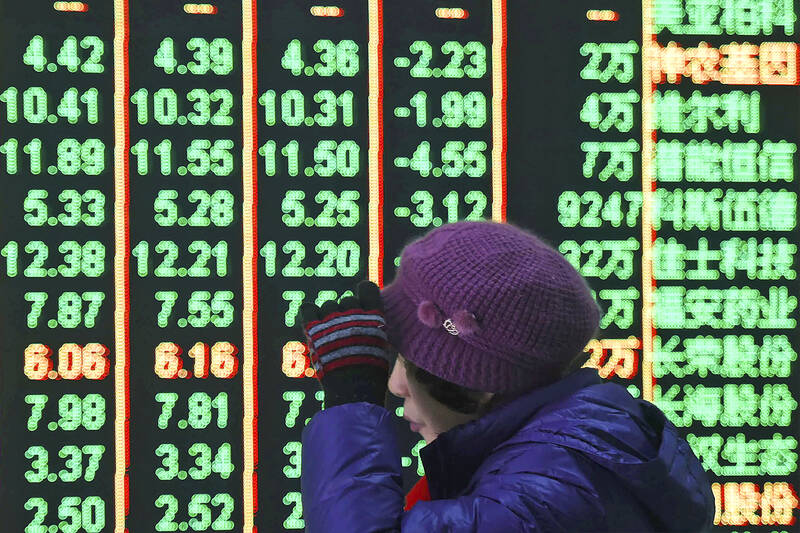Chinese shares gyrated yesterday, sinking to five-year lows, after stock market regulators sought to reassure jittery investors with a promise to crack down on stock price manipulation and “malicious short selling.”
Shares in Shanghai and the smaller market in Shenzhen, near Hong Kong, swung between big losses and small gains throughout the day. The markets have languished on the heavy selling of property shares that have suffered with a slump in the real-estate market.
Market observers said there were signs the authorities had, as is often the case, ordered big institutional investors to step up buying of state-owned banks and other heavyweights.

Photo: AP
However, shares still mostly lost ground on worries about China’s economic outlook, with traders unmoved by authorities’ pledges of support for markets.
Propping up the market with cash cannot be sustained and would not provide a lasting turnaround as long as the property sector remains weak and a weight on consumer and investor confidence, analysts and investors said, adding that the task is also massive: Chinese stocks are worth about US$9 trillion.
The main index in the smaller market in Shenzhen sank 4.4 percent, but then rapidly recovered, bouncing between losses and gains and closing 1.1 percent lower. The Shanghai Composite Index slipped 3.5 percent at one point and closed 1 percent lower, at 2,702.19 points.
Hong Kong’s Hang Seng Index slipped 0.15 percent, or 23.55 points, to 15,510.01 points.
Wilder swings were also seen on the CSI 1000 which fell as much as 8.7 percent yesterday before regaining some of the losses to close down 6.1 percent. The CSI 1000 is often used to track so-called “snowball derivatives,” which offer big gains, but also could result in exaggerated losses.
Chinese companies have lost billions of US dollars of market value as investors shifted away from the markets in Hong Kong and China in search of better returns.
The China Securities Regulatory Commission on Sunday said it would redouble enforcement of measures against crimes such as market manipulation and malicious short selling, while guiding more medium and long-term funds into the market.
That move followed other support measures such as restrictions on short-selling or reductions in trading duties in the past few days that appear to have done little to reassure investors who have been pulling money out of the markets for months.
Comments by former US president Donald Trump that he might impose a tariff of more than 60 percent on imports of Chinese goods if he is re-elected also hurt market sentiment.

KEEPING UP: The acquisition of a cleanroom in Taiwan would enable Micron to increase production in a market where demand continues to outpace supply, a Micron official said Micron Technology Inc has signed a letter of intent to buy a fabrication site in Taiwan from Powerchip Semiconductor Manufacturing Corp (力積電) for US$1.8 billion to expand its production of memory chips. Micron would take control of the P5 site in Miaoli County’s Tongluo Township (銅鑼) and plans to ramp up DRAM production in phases after the transaction closes in the second quarter, the company said in a statement on Saturday. The acquisition includes an existing 12 inch fab cleanroom of 27,871m2 and would further position Micron to address growing global demand for memory solutions, the company said. Micron expects the transaction to

Vincent Wei led fellow Singaporean farmers around an empty Malaysian plot, laying out plans for a greenhouse and rows of leafy vegetables. What he pitched was not just space for crops, but a lifeline for growers struggling to make ends meet in a city-state with high prices and little vacant land. The future agriculture hub is part of a joint special economic zone launched last year by the two neighbors, expected to cost US$123 million and produce 10,000 tonnes of fresh produce annually. It is attracting Singaporean farmers with promises of cheaper land, labor and energy just over the border.

US actor Matthew McConaughey has filed recordings of his image and voice with US patent authorities to protect them from unauthorized usage by artificial intelligence (AI) platforms, a representative said earlier this week. Several video clips and audio recordings were registered by the commercial arm of the Just Keep Livin’ Foundation, a non-profit created by the Oscar-winning actor and his wife, Camila, according to the US Patent and Trademark Office database. Many artists are increasingly concerned about the uncontrolled use of their image via generative AI since the rollout of ChatGPT and other AI-powered tools. Several US states have adopted

A proposed billionaires’ tax in California has ignited a political uproar in Silicon Valley, with tech titans threatening to leave the state while California Governor Gavin Newsom of the Democratic Party maneuvers to defeat a levy that he fears would lead to an exodus of wealth. A technology mecca, California has more billionaires than any other US state — a few hundred, by some estimates. About half its personal income tax revenue, a financial backbone in the nearly US$350 billion budget, comes from the top 1 percent of earners. A large healthcare union is attempting to place a proposal before